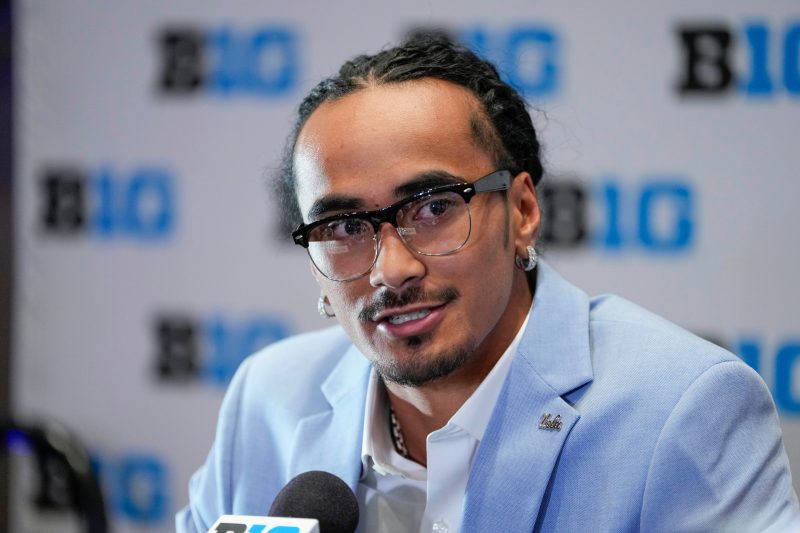
Nico Iamaleava had opportunity to expose college football NIL and punted
LAS VEGAS — He could’ve changed it all, pulled back the curtain on the underbelly of college football and revealed its sordid secrets.
And he punted.
There was new UCLA quarterback Nico Iamaleava, ground zero for all that is wrong in the new age of player empowerment in college football, taking the fifth at Big Ten media days on Thursday, July 24 when he could’ve been transcendent.
Shutting it down when he should’ve lit it up.
New team, new goals, but no new answers from the one player with intimate knowledge of – and in a unique position to explain – how the nation’s second-most popular sport has driven its spotless reputation into the ditch with a never-ending money grab by players and universities.
“I don’t speak on money matters,” Iamaleava said over and over. “I’m just here for ball and school.”
And away we go.
Iamaleava, whose $8 million dollar deal with Tennessee three years ago started NIL money madness, could’ve stood long and strong in his first public comments about his controversial departure. Stretch his 6-feet-6 frame to expand beyond his orbit, and proudly explain his controversial leverage move to UCLA and everything that came with it.
He could’ve detailed how the player procurement sausage is made – recruiting, contract negotiations, predatory sports agents and their bloated fees, prove-it or lose it rosters spots, player retention and player run-off – and how, despite what Joe Sixpack thinks, players aren’t the boogeyman.
Instead he talked about “false (media) reports” and the “noise” outside his inner circle that he ignores by playing video games. He said he loved his time at Tennessee, and he just wanted to go home to Los Angeles.
“It’s not about the money,” he said. “I did what was best for me.”
If you want to blame someone for this convoluted and multiplying mess, for the constant state of flux and turnover among 265 Bowl and Championship Subdivision football playing schools, don’t blame the players.
They’re simply working within the rules laid out by those in power. Or lack of rules.
The real villain in the process are universities presidents. Not players, not coaches, not conference commissioners.
Presidents run college football, and frankly, a majority have no idea what they’re doing.
The same university presidents who five years ago saw the get yours, shared revenue train barreling down the tracks and ignored it — then said, screw it, let’s allow players to negotiate NIL deals with free player movement.
What could go wrong?
The same university presidents who time after time watched their dysfunctional NCAA lose spectacularly in major legal cases, but kept doubling down on stupid.
It doesn’t really matter why Iamaleava left Tennessee, or how or why he used leverage days before the opening of the spring portal. Or how it failed.
Doesn’t matter if he tried to push Tennessee to put more pieces from the portal around him so he could further develop his NFL bonafides, or if it were just a money play. Or both.
What matters is an unguarded system has been set up, and players are taking advantage of the system. Why wouldn’t they?
Iamaleava isn’t the first to use leverage, and won’t be the last. He was simply the most high profile because of his position and the leverage moment — and because Tennessee called his bluff.
These things happen all the time across all of college football, and they’re not going to end. In fact, they’ll get worse.
Because no matter how hard university presidents try to protect their media rights money by refusing to collectively bargain with players (and therefore pay significantly more to players), they haven’t been able to legally pull it off.
Even the recent groundbreaking House settlement is beginning to fall apart, with its critical management provision of private NIL deals already facing significant legal hurdles.
The moment was there for Iamaleava to seize, to grab the wheel of a sport careening into the unknown and level a shock to the system. Expose the underbelly, force change.
Instead of punting.
“I’ll let my business reps and agent take care of that,” Iamaleava said.
What could go wrong?
Matt Hayes is the senior national college football writer for USA TODAY Sports Network. Follow him on X at @MattHayesCFB.
